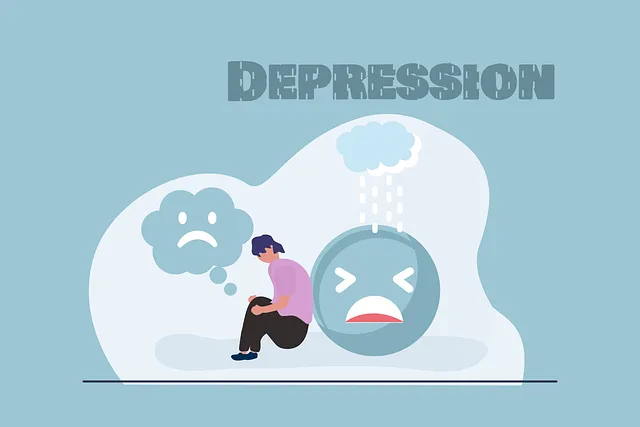The Northglenn Kaiser Permanente psychiatry reviews expose the pervasive impact of stigma on mental health, as evidenced by personal stories of discrimination exacerbating conditions like anxiety and depression. The studies show stigma's widespread effect, impacting individuals, families, and communities. Key strategies for stigma reduction include public awareness campaigns, conflict resolution techniques, emotional well-being promotion, Mental Wellness Coaching Programs, and Compassion Cultivation Practices within healthcare systems. Community engagement initiatives like workshops on Inner Strength Development and Crisis Intervention Guidance have led to significant positive changes. Media representations also play a crucial role in shaping societal attitudes, with balanced and accurate portrayals being essential for fostering understanding. Northglenn Kaiser Permanente's integrated psychiatric services model has proven effective, offering valuable insights for policy implications and future mental healthcare practices.
Stigma surrounding mental illness persists, negatively impacting help-seeking behaviors and recovery outcomes. This comprehensive article explores strategies to reduce mental health stigma through various lenses, drawing insights from the experiences of Northglenn Kaiser Permanente Psychiatry Reviews. We delve into the impact of stigma, successful programs, community engagement, media representation, and policy implications, offering a multi-faceted approach for more supportive communities and improved access to care.
- Understanding the Impact of Stigma on Mental Health: A Focus Group Analysis Using Northglenn Kaiser Permanente Psychiatry Reviews
- Strategies for Reducing Stigma: Lessons from Successful Programs Reviewed by Kaiser Permanente Northglenn
- The Role of Community Engagement in Overcoming Mental Illness Stigma: Evidence from Local Initiatives at Kaiser Permanente Northglenn
- Media Representation and Mental Health: A Critical Review of Portrayals in Popular Culture as Seen through the Lens of Kaiser Permanente Northglenn Psychiatry Reviews
- Policy Implications for Stigma Reduction: Insights from Kaiser Permanente Northglenn's Experience and Recommendations for Future Practices
Understanding the Impact of Stigma on Mental Health: A Focus Group Analysis Using Northglenn Kaiser Permanente Psychiatry Reviews

A focus group analysis of Northglenn Kaiser Permanente psychiatry reviews reveals profound impacts of stigma on mental health. Participants shared vivid accounts of how societal perceptions and discrimination significantly contribute to anxiety, depression, and avoidance of seeking help. The study underscores the pervasive nature of mental illness stigma, affecting not just individuals but also their families and communities.
This insight emphasizes the urgent need for stigma reduction efforts that go beyond awareness campaigns. Incorporating initiatives like Mental Wellness Coaching Programs Development, Coping Skills Development, and Compassion Cultivation Practices within healthcare systems can play a pivotal role in dismantling these barriers. By fostering understanding, empathy, and support, such programs have the potential to transform how mental health is perceived and treated, ultimately enhancing access to care and promoting mental wellness.
Strategies for Reducing Stigma: Lessons from Successful Programs Reviewed by Kaiser Permanente Northglenn

Stigma reduction efforts have shown promising outcomes through various strategies employed by successful programs, as reviewed by Kaiser Permanente Northglenn. One effective approach is public awareness campaigns development, which educates communities about mental health conditions, breaking down misconceptions and promoting understanding. These campaigns often utilize multimedia platforms to reach a wide audience, ensuring messages are accessible and impactful.
Additionally, conflict resolution techniques and emotional well-being promotion techniques have been integral in fostering inclusive environments. Programs that facilitate open dialogues between individuals with mental illness and their communities help normalize conversations about mental health. By encouraging empathy and understanding, these initiatives reduce the barriers faced by those seeking support and treatment for psychiatric conditions.
The Role of Community Engagement in Overcoming Mental Illness Stigma: Evidence from Local Initiatives at Kaiser Permanente Northglenn

In the fight against mental illness stigma, community engagement plays a pivotal role, as demonstrated by successful initiatives at Kaiser Permanente Northglenn. Local efforts have shown that fostering open conversations and building supportive environments are key to reducing stigma associated with mental health issues. Through various programs, such as Mental Wellness Coaching and workshops focusing on Conflict Resolution Techniques and Inner Strength Development, the community has actively participated in breaking down barriers and promoting understanding. These initiatives not only provide individuals with practical tools for managing their mental wellness but also encourage a culture of empathy and acceptance.
The evidence from Northglenn Kaiser Permanente psychiatry reviews highlights that community-driven programs can significantly impact stigma reduction. By engaging local residents, these initiatives ensure that the unique needs and challenges faced by diverse populations are addressed effectively. Through education, active listening, and collaborative problem-solving, communities can dispel misconceptions and create a more inclusive setting where individuals struggling with mental illness feel supported and empowered to seek help without fear of judgment.
Media Representation and Mental Health: A Critical Review of Portrayals in Popular Culture as Seen through the Lens of Kaiser Permanente Northglenn Psychiatry Reviews

The media plays a pivotal role in shaping societal perceptions about mental health. A critical review of portrayals in popular culture, as observed through the lens of Kaiser Permanente Northglenn Psychiatry Reviews, reveals both positive strides and lingering stereotypes. Many modern narratives are taking efforts to humanize individuals with mental illness, offering glimpses into their daily struggles and triumphs. This shift is encouraging, aligning with initiatives like Social Skills Training and Compassion Cultivation Practices that foster understanding and empathy.
However, older media representations often perpetuate harmful stereotypes, depicting mental illness as a character flaw or a source of fear. These outdated portrayals can hinder progress in stigma reduction efforts. Crisis Intervention Guidance, while crucial for immediate support, is not a sustainable solution without balanced and accurate media portrayal. The review suggests that a more nuanced and diverse depiction of mental health in popular culture is essential to foster an inclusive and supportive society.
Policy Implications for Stigma Reduction: Insights from Kaiser Permanente Northglenn's Experience and Recommendations for Future Practices

Kaiser Permanente Northglenn’s experience in stigma reduction highlights several policy implications that can guide future practices. By integrating psychiatric services into primary care settings and promoting a holistic approach to mental health, they’ve seen success in improving patient outcomes and reducing stigma. This model emphasizes the importance of early intervention and continuous support, ensuring individuals receive comprehensive care tailored to their unique needs.
The organization’s focus on training healthcare providers in emotional intelligence and effective communication has been pivotal. This includes enhancing emotional regulation skills among staff and fostering an environment that encourages positive thinking. Such initiatives not only improve patient interactions but also contribute to a more inclusive and supportive mental health ecosystem, where individuals feel understood and empowered to seek help without fear of judgment.
The comprehensive exploration of mental illness stigma reduction efforts by Northglenn Kaiser Permanente Psychiatry Reviews highlights a multifaceted approach. Through focus group analyses, successful program reviews, community engagement initiatives, and media representation critiques, it’s evident that addressing stigma requires collaboration across sectors. By integrating strategies from these diverse areas, we can create a more inclusive society that fosters understanding and support for those facing mental health challenges. The policy implications and recommendations from this study serve as valuable guidelines to guide future practices in reducing the enduring impact of mental illness stigma.


